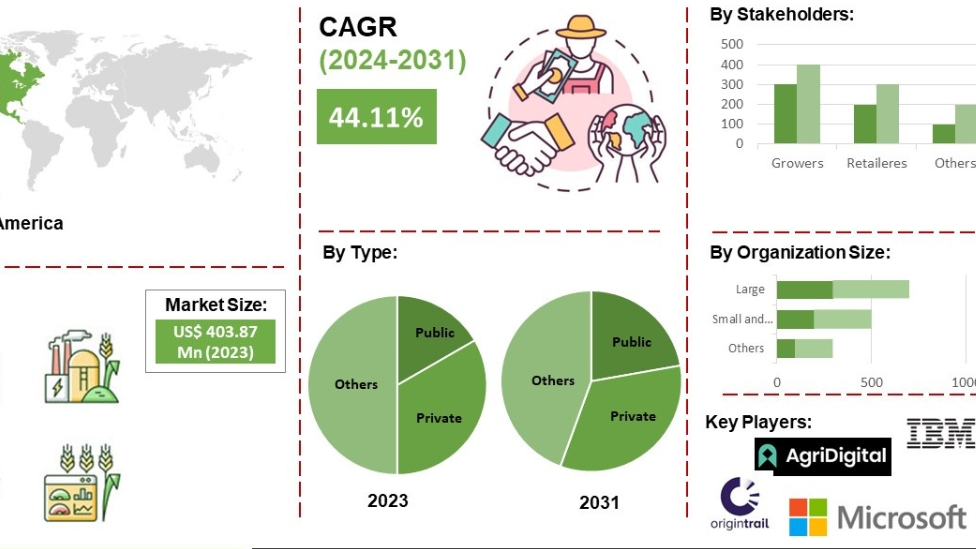The worldwide blockchain market is expanding quickly in the agriculture and food supply chain sector, revolutionising the way the sector functions. According to InsightAce Analytic, the market, which was valued at $403.87 million in 2023, is expected to grow at an impressive CAGR of 44.11% from 2024 to 2031, reaching $7,419.9 million by that time.
Factors That Drive Market Growth
1. Traceability and Transparency Industry adoption of blockchain technology is being driven by consumer demands for ethical sourcing and transparency. By producing unchangeable records of goods from their point of origin to point of consumption, blockchain technology promotes confidence among stakeholders and customers by enabling real-time traceability. This increased visibility lowers risks, boosts compliance, and allays growing safety and authenticity worries.
2. Prevention of Fraud and Counterfeiting By guaranteeing data integrity, blockchain’s safe and decentralised architecture reduces the risk of fraud and counterfeiting. Since authenticity has a direct impact on consumer trust and health, this element is essential for the food supply chain.
3. Enhanced Productivity By use of automation Supply chain procedures are streamlined by blockchain integration, which lowers manual intervention and boosts operational effectiveness. Payment and settlement procedures are expedited by automation, which also guarantees smooth governance amongst parties.
Principal Obstacles in the Sector
1. Expensive implementation fees
Blockchain technology adoption is still costly despite its advantages. One of the biggest obstacles for small and medium-sized businesses (SMEs) is the initial investment in infrastructure, training, and development.
2. Issues with Scalability
Scaling up blockchain networks to manage high transaction volumes is difficult, especially in international supply chains. One of the main challenges is ensuring smooth integration without sacrificing speed or effectiveness.
3. Insufficient Standardisation
The lack of consistent guidelines for implementing blockchain in the food and agriculture industries prevents widespread adoption and interoperability. For future expansion, a unified framework must be established.
Prospects for Blockchain Integration in the Future
There are encouraging opportunities for growth in the industry:
Sustainable Agriculture Practices: By encouraging openness in sustainable sourcing, blockchain helps environmentally favourable projects.
Cybersecurity Improvements: Blockchain provides strong security for sensitive data as cyber threats increase.
Remote Work and Collaboration: Distributed ledgers make it easy for stakeholders to work together, even when they are located on different continents.
Current Events Developing the Market
Cooperation in the Seafood Sector
In order to improve transparency in Norway’s seafood supply chain and provide consumers worldwide with safer, traceable products, IBM, Atea, and the Norwegian Seafood Association started a blockchain project in 2020.
Azure Blockchain Service from Microsoft
Microsoft launched a fully managed blockchain service in 2019 that lets companies build and maintain consortium blockchain networks that are connected with Azure technologies.
Growth of IBM Food Trust
In 2019, Albertsons Companies became a member of IBM’s Food Trust, using blockchain technology to improve food quality and traceability.
Perspectives on Market Segmentation
Type-wise
By Application, Public-Private Hybrid/Consortium
Producers
Food Producers, Processors, and Retailers by Suppliers
Providers of Applications
Infrastructure Providers by Organisation Size: Middleware Providers
SMEs, or small and medium-sized businesses
Big Businesses by Region
North America: Setting the standard with cutting-edge technological infrastructure and encouraging governmental regulations.
Europe: Growing consumer awareness and legislative support are driving innovation.
Asia-Pacific: Quick uptake in developing nations such as China and India.
Blockchain is being gradually adopted across Latin America, the Middle East, and Africa to address regional supply chain issues.
Leading Companies in the Industry
Leading businesses influencing this market include:
IBM in the United States
Microsoft in the United States
In Switzerland, Ambrosus
Germany’s SAP SE
OriginTrail: Slovenia; Origin: UK
Europe’s TE-FOOD International GmbH
The market for blockchain in agriculture and food supply chains is expanding due to improvements in efficiency, traceability, and transparency. The potential for innovation and expansion is still enormous, despite obstacles like cost and scalability, opening the door to a more secure and sustainable global food supply.
Visit InsightAce Analytic to view the complete 180-page study for a more thorough analysis of this market.




























